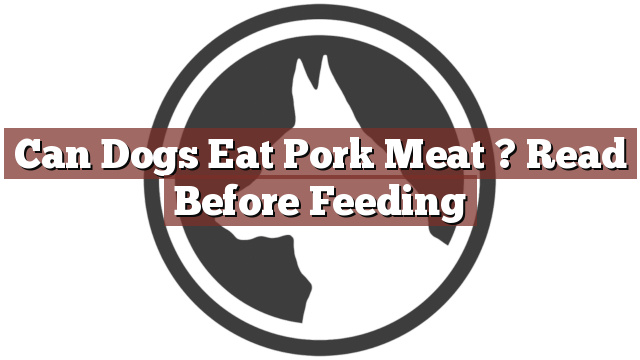Understanding Your Dog’s Dietary Needs
As responsible pet owners, it is crucial to understand our dogs’ dietary needs to ensure they remain healthy and happy. Dogs are primarily carnivorous animals, and their diet should mainly consist of animal protein. However, not all types of meat are suitable for dogs, and it is essential to be aware of what can and cannot be included in their meals.
Can Dogs Eat Pork Meat? Read Before Feeding
Can dogs eat pork meat? This is a common question that many dog owners ask. The answer is yes, dogs can eat pork meat, but there are a few important factors to consider before feeding it to your furry friend. Pork is a rich source of protein, vitamins, and minerals, which can be beneficial for dogs. However, careful attention must be paid to the preparation and cooking of pork to ensure it is safe for canine consumption.
Pros and Cons of Feeding Pork Meat to Your Dog
Feeding pork meat to your dog can have both pros and cons. On the positive side, pork is a good source of protein, which is essential for your dog’s muscle development and overall health. It also contains various vitamins and minerals, including B vitamins, zinc, and selenium, which are beneficial for dogs. Additionally, pork can be a tasty and enjoyable treat for your furry friend.
However, there are also potential drawbacks to feeding pork meat to your dog. Pork is high in fat, and excessive fat consumption can lead to obesity and other health issues in dogs. It is important to remove any visible fat before feeding pork to your dog and to ensure that it is cooked thoroughly to eliminate the risk of parasites or bacterial contamination. Additionally, some dogs may have specific dietary restrictions or allergies that make pork unsuitable for them.
In Conclusion: Weighing the Risks and Benefits of Pork for Dogs
In conclusion, while dogs can eat pork meat, it is crucial to exercise caution and moderation. Before incorporating pork into your dog’s diet, consult with your veterinarian to ensure it is appropriate for your specific pet. If your dog has any pre-existing health conditions or dietary restrictions, such as pancreatitis or allergies, it is best to avoid feeding pork altogether.
When feeding pork to your dog, make sure to choose lean cuts, remove any visible fat, and cook it thoroughly. Avoid seasoning the meat with harmful additives such as salt, garlic, or onion, as these can be toxic to dogs. Remember that pork should only be given as an occasional treat and should not replace a balanced diet specifically formulated for dogs.
By understanding your dog’s dietary needs and making informed decisions about their food, you can ensure their overall well-being and provide them with a happy and healthy life.
Thank you for taking the time to read through our exploration of [page_title]. As every dog lover knows, our furry friends have unique dietary needs and responses, often varying from one canine to another. This is why it's paramount to approach any changes in their diet with caution and knowledge.
Before introducing any new treats or making alterations to your dog's diet based on our insights, it's crucial to consult with a veterinarian about [page_title]. Their expertise ensures that the choices you make are well-suited to your particular pet's health and well-being.
Even seemingly harmless foods can sometimes lead to allergic reactions or digestive issues, which is why monitoring your dog after introducing any new food item is essential.
The content provided here on [page_title] is crafted with care, thorough research, and a genuine love for dogs. Nevertheless, it serves as a general guideline and should not be considered a substitute for professional veterinary advice.
Always prioritize the expert insights of your veterinarian, and remember that the health and happiness of your furry companion come first.
May your journey with your pet continue to be filled with joy, love, and safe culinary adventures. Happy reading, and even happier snacking for your canine friend!

